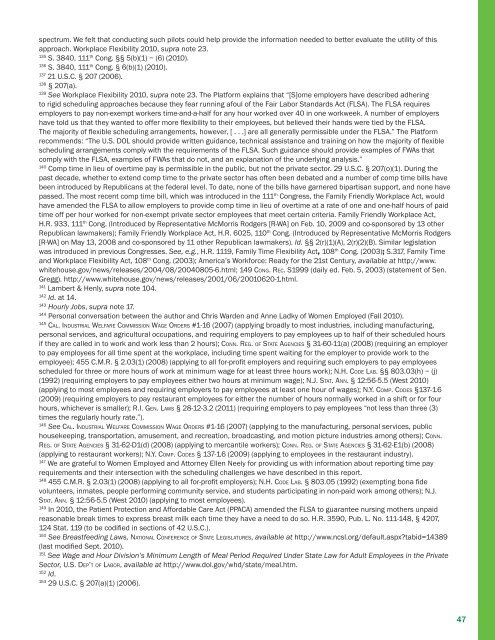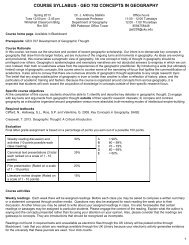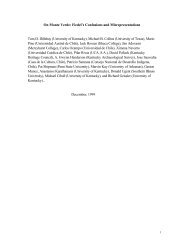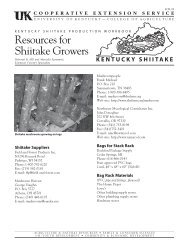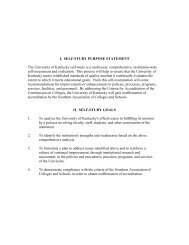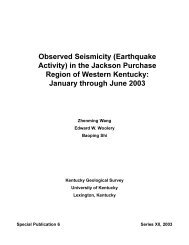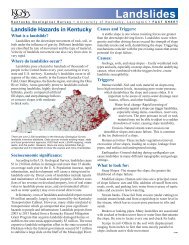Flexible Workplace Solutions for Low-Wage Hourly Workers
Flexible Workplace Solutions for Low-Wage Hourly Workers
Flexible Workplace Solutions for Low-Wage Hourly Workers
You also want an ePaper? Increase the reach of your titles
YUMPU automatically turns print PDFs into web optimized ePapers that Google loves.
spectrum. We felt that conducting such pilots could help provide the in<strong>for</strong>mation needed to better evaluate the utility of this<br />
approach. <strong>Workplace</strong> Flexibility 2010, supra note 23.<br />
135<br />
S. 3840, 111 th Cong. §§ 5(b)(1) – (6) (2010).<br />
136<br />
S. 3840, 111 th Cong. § 6(b)(1) (2010).<br />
137<br />
21 U.S.C. § 207 (2006).<br />
138<br />
§ 207(a).<br />
139<br />
See <strong>Workplace</strong> Flexibility 2010, supra note 23. The Plat<strong>for</strong>m explains that “[S]ome employers have described adhering<br />
to rigid scheduling approaches because they fear running afoul of the Fair Labor Standards Act (FLSA). The FLSA requires<br />
employers to pay non-exempt workers time-and-a-half <strong>for</strong> any hour worked over 40 in one workweek. A number of employers<br />
have told us that they wanted to offer more fl exibility to their employees, but believed their hands were tied by the FLSA.<br />
The majority of fl exible scheduling arrangements, however, [ . . .] are all generally permissible under the FLSA.” The Plat<strong>for</strong>m<br />
recommends: “The U.S. DOL should provide written guidance, technical assistance and training on how the majority of fl exible<br />
scheduling arrangements comply with the requirements of the FLSA. Such guidance should provide examples of FWAs that<br />
comply with the FLSA, examples of FWAs that do not, and an explanation of the underlying analysis.”<br />
140<br />
Comp time in lieu of overtime pay is permissible in the public, but not the private sector. 29 U.S.C. § 207(o)(1). During the<br />
past decade, whether to extend comp time to the private sector has often been debated and a number of comp time bills have<br />
been introduced by Republicans at the federal level. To date, none of the bills have garnered bipartisan support, and none have<br />
passed. The most recent comp time bill, which was introduced in the 111 th Congress, the Family Friendly <strong>Workplace</strong> Act, would<br />
have amended the FLSA to allow employers to provide comp time in lieu of overtime at a rate of one and one-half hours of paid<br />
time off per hour worked <strong>for</strong> non-exempt private sector employees that meet certain criteria. Family Friendly <strong>Workplace</strong> Act,<br />
H.R. 933, 111 th Cong. (Introduced by Representative McMorris Rodgers [R-WA] on Feb. 10, 2009 and co-sponsored by 13 other<br />
Republican lawmakers); Family Friendly <strong>Workplace</strong> Act, H.R. 6025, 110 th Cong. (Introduced by Representative McMorris Rodgers<br />
[R-WA] on May 13, 2008 and co-sponsored by 11 other Republican lawmakers). Id. §§ 2(r)(1)(A), 2(r)(2)(B). Similar legislation<br />
was introduced in previous Congresses. See, e.g., H.R. 1119, Family Time Flexibility Act, 108 th Cong. (2003); S.317, Family Time<br />
and <strong>Workplace</strong> Flexibility Act, 108 th Cong. (2003); America’s Work<strong>for</strong>ce: Ready <strong>for</strong> the 21st Century, available at http://www.<br />
whitehouse.gov/news/releases/2004/08/20040805-6.html; 149 CONG. REC. S1999 (daily ed. Feb. 5, 2003) (statement of Sen.<br />
Gregg). http://www.whitehouse.gov/news/releases/2001/06/20010620-1.html.<br />
141<br />
Lambert & Henly, supra note 104.<br />
142<br />
Id. at 14.<br />
143<br />
<strong>Hourly</strong> Jobs, supra note 17.<br />
144<br />
Personal conversation between the author and Chris Warden and Anne Ladky of Women Employed (Fall 2010).<br />
145<br />
CAL. INDUSTRIAL WELFARE COMMISSION WAGE ORDERS #1-16 (2007) (applying broadly to most industries, including manufacturing,<br />
personal services, and agricultural occupations, and requiring employers to pay employees up to half of their scheduled hours<br />
if they are called in to work and work less than 2 hours); CONN. REG. OF STATE AGENCIES § 31-60-11(a) (2008) (requiring an employer<br />
to pay employees <strong>for</strong> all time spent at the workplace, including time spent waiting <strong>for</strong> the employer to provide work to the<br />
employee); 455 C.M.R. § 2.03(1) (2008) (applying to all <strong>for</strong>-profi t employers and requiring such employers to pay employees<br />
scheduled <strong>for</strong> three or more hours of work at minimum wage <strong>for</strong> at least three hours work); N.H. CODE LAB. §§ 803.03(h) – (j)<br />
(1992) (requiring employers to pay employees either two hours at minimum wage); N.J. STAT. ANN. § 12:56-5.5 (West 2010)<br />
(applying to most employees and requiring employers to pay employees at least one hour of wages); N.Y. COMP. CODES §137-1.6<br />
(2009) (requiring employers to pay restaurant employees <strong>for</strong> either the number of hours normally worked in a shift or <strong>for</strong> four<br />
hours, whichever is smaller); R.I. GEN. LAWS § 28-12-3.2 (2011) (requiring employers to pay employees “not less than three (3)<br />
times the regularly hourly rate.”).<br />
146<br />
See CAL. INDUSTRIAL WELFARE COMMISSION WAGE ORDERS #1-16 (2007) (applying to the manufacturing, personal services, public<br />
housekeeping, transportation, amusement, and recreation, broadcasting, and motion picture industries among others); CONN.<br />
REG. OF STATE AGENCIES § 31-62-D1(d) (2008) (applying to mercantile workers); CONN. REG. OF STATE AGENCIES § 31-62-E1(b) (2008)<br />
(applying to restaurant workers); N.Y. COMP. CODES § 137-1.6 (2009) (applying to employees in the restaurant industry).<br />
147<br />
We are grateful to Women Employed and Attorney Ellen Neely <strong>for</strong> providing us with in<strong>for</strong>mation about reporting time pay<br />
requirements and their intersection with the scheduling challenges we have described in this report.<br />
148<br />
455 C.M.R. § 2.03(1) (2008) (applying to all <strong>for</strong>-profi t employers); N.H. CODE LAB. § 803.05 (1992) (exempting bona fi de<br />
volunteers, inmates, people per<strong>for</strong>ming community service, and students participating in non-paid work among others); N.J.<br />
STAT. ANN. § 12:56-5.5 (West 2010) (applying to most employees).<br />
149<br />
In 2010, the Patient Protection and Af<strong>for</strong>dable Care Act (PPACA) amended the FLSA to guarantee nursing mothers unpaid<br />
reasonable break times to express breast milk each time they have a need to do so. H.R. 3590, Pub. L. No. 111-148, § 4207,<br />
124 Stat. 119 (to be codifi ed in sections of 42 U.S.C.).<br />
150<br />
See Breastfeeding Laws, NATIONAL CONFERENCE OF STATE LEGISLATURES, available at http://www.ncsl.org/default.aspx?tabid=14389<br />
(last modifi ed Sept. 2010).<br />
151<br />
See <strong>Wage</strong> and Hour Division’s Minimum Length of Meal Period Required Under State Law <strong>for</strong> Adult Employees in the Private<br />
Sector, U.S. DEP’T OF LABOR, available at http://www.dol.gov/whd/state/meal.htm.<br />
152<br />
Id.<br />
153<br />
29 U.S.C. § 207(a)(1) (2006).<br />
47


